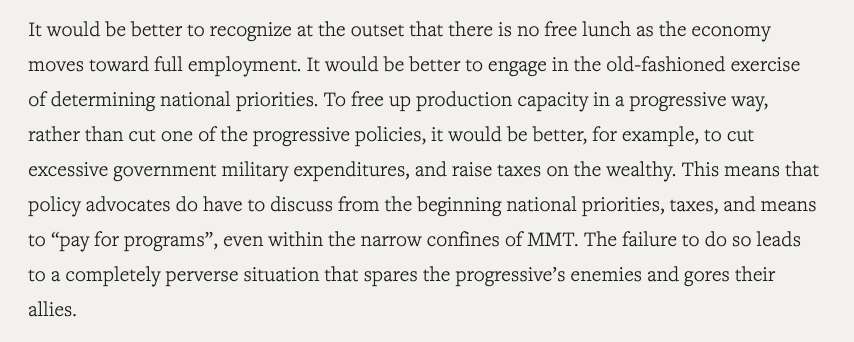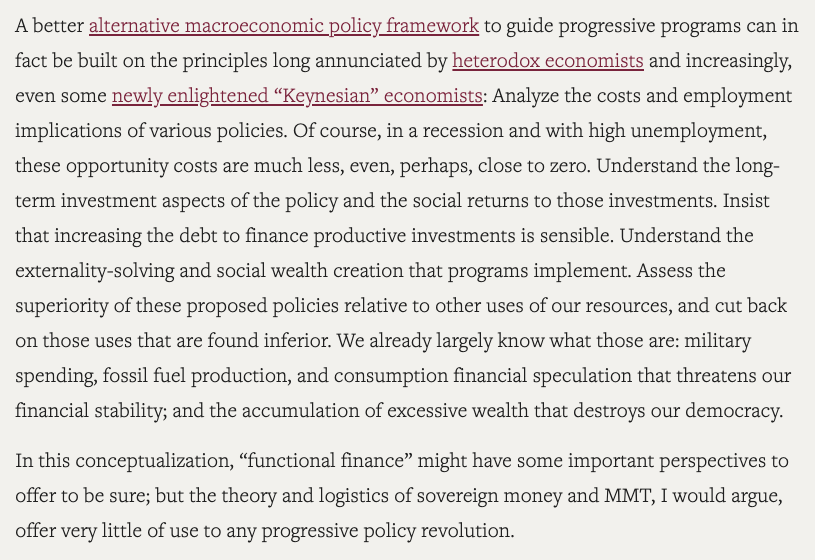1. I appreciate the work MMT advocates have done to point out deficits are a stupid way to organize policy constrains. I especially appreciate @rohangrey and his work on institutional questions of how money intersects with the real economy. That said... ineteconomics.org/perspectives/b…
@rohangrey 2. We've always known that money printing is a sovereign question. Money coining is in the Constitution for a reason. Greenbackers, populists and inflationists from the 1870s-1930s presaged Keynes. As did Benjamin Franklin.
@rohangrey 3. There have always been bitter fights over the founding of the Federal Reserve, and over institutional financial questions in the 20th century. J.M. Keynes, Nicholas Kaldor, and Hyman Minksy were core vessels for this debate. Who should hold power? The people or Wall Street?
@rohangrey 4. Paul Volcker created the modern idea of independence of the Federal Reserve and linked with the need to not run deficits. This became a quasi-Constitutional limit on democracy. The people can't print money, but banks can. That was Volcker's legacy.
@rohangrey 5. Policymakers in the 1970s, and then Volcker created Too Big to Fail by backstopping bad banks. They used independence of the Fed and deficit spending as an excuse to force the rest of us to pay for their follies. @csissoko lays this out beautifully. syntheticassets.wordpress.com/2019/08/07/dis…
@rohangrey @csissoko 6. Monetary policy, in other words, is an *institutional* question. How money flows, who gets to create it, how it is destroyed. Which functional finance advocates know. Which everyone knows. Keynesian economics is really a fight over power.
@rohangrey @csissoko 7. What I appreciate about @rohangrey is how he really is tackling the nitty gritty of payment systems. This is the debate we need to have. That's where power lives. However the deficit arguments by @StephanieKelton are problematic. ineteconomics.org/perspectives/b…
@rohangrey @csissoko @StephanieKelton 8. @StephanieKelton isn't saying that we have to tackle power, or that the Fed should be democratic. Those are hard problems. She just says there's a free lunch. There isn't. We have to choose how to pay for what we want.
@rohangrey @csissoko @StephanieKelton 9. Running interest rates at zero and using taxes to regulate resources is besides the point if you leave out massive speculation going on in derivatives markets. We have got to restructure the big banks and end this multi-trillion speculative nonsense. ineteconomics.org/perspectives/b…
@rohangrey @csissoko @StephanieKelton 10. It's why Bernie doesn't accept MMT. He knows at some level that we do have to pay for what we want. We understand what paying means. It means choosing priorities. Being pedantic and distorting the meaning of pay is disingenuous. Yes we can run deficits. Yes we have to pay.
@rohangrey @csissoko @StephanieKelton 11. Without controls on capital zero interest rates leads to massive M&A activity. Massive deficit spending leads to massive trade deficits and the offshoring of U.S. production. But you don't see discussions of these problems.
@rohangrey @csissoko @StephanieKelton 12. And that's because a slice of MMT people - and I've talked to some - do want to offshore U.S. production. The Wall Street adherents of MMT think we should be removing all controls on banking power and just print money.
@rohangrey @csissoko @StephanieKelton 13. As Gerald Epstein says, ignoring priorities and institutional constraints will cause massive problems. 

@rohangrey @csissoko @StephanieKelton 14. Yup, exactly. Mosler does not think the ability to produce is meaningful. He wants us to be rentiers.
https://twitter.com/ektrit/status/1165627278556110848
@rohangrey @csissoko @StephanieKelton 15. So what to do? Analyze institutional structures and set priorities. Tax the wealthy, get rid of fossil fuels, lower useless military spending, reduce the power of Wall Street, etc. That's not a free lunch. That's a fight. 

@rohangrey @csissoko @StephanieKelton 16. And as I said, I appreciate this part of MMT very much. But Epstein's been tracing these arguments for decades, and he's very much not lamenting a democratic turn.
https://twitter.com/rddrayton/status/1165638752309350400
@rohangrey @csissoko @StephanieKelton 17. Last point. I've heard a lot of people saying that MMT never offers a free lunch. Here's @StephanieKelton making it quite clear that the ultra-wealthy need not 'pay' for a Green New Deal because everyone is better off under MMT. Free lunch. commondreams.org/views/2019/02/…
• • •
Missing some Tweet in this thread? You can try to
force a refresh








